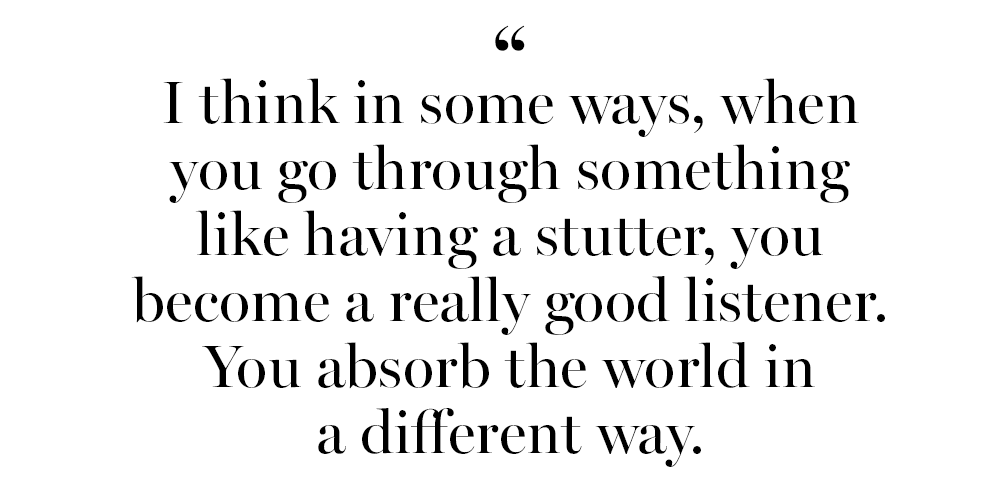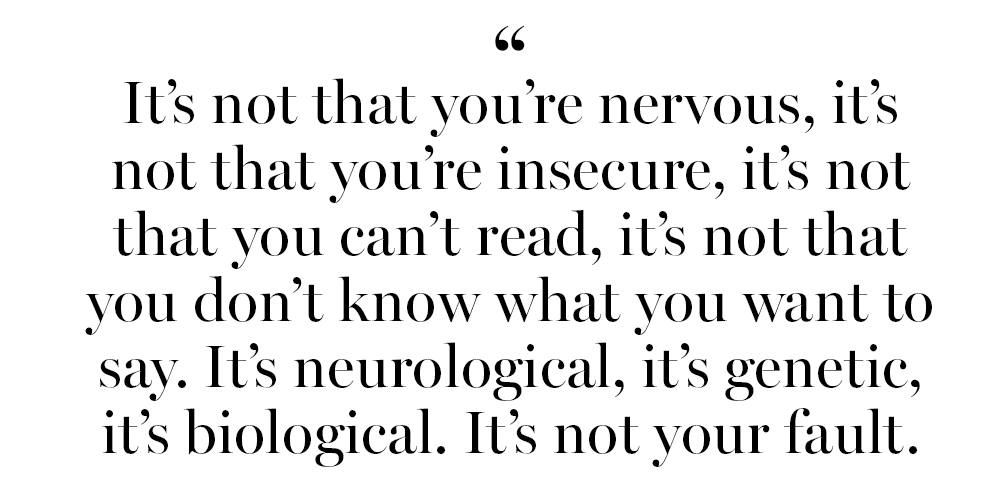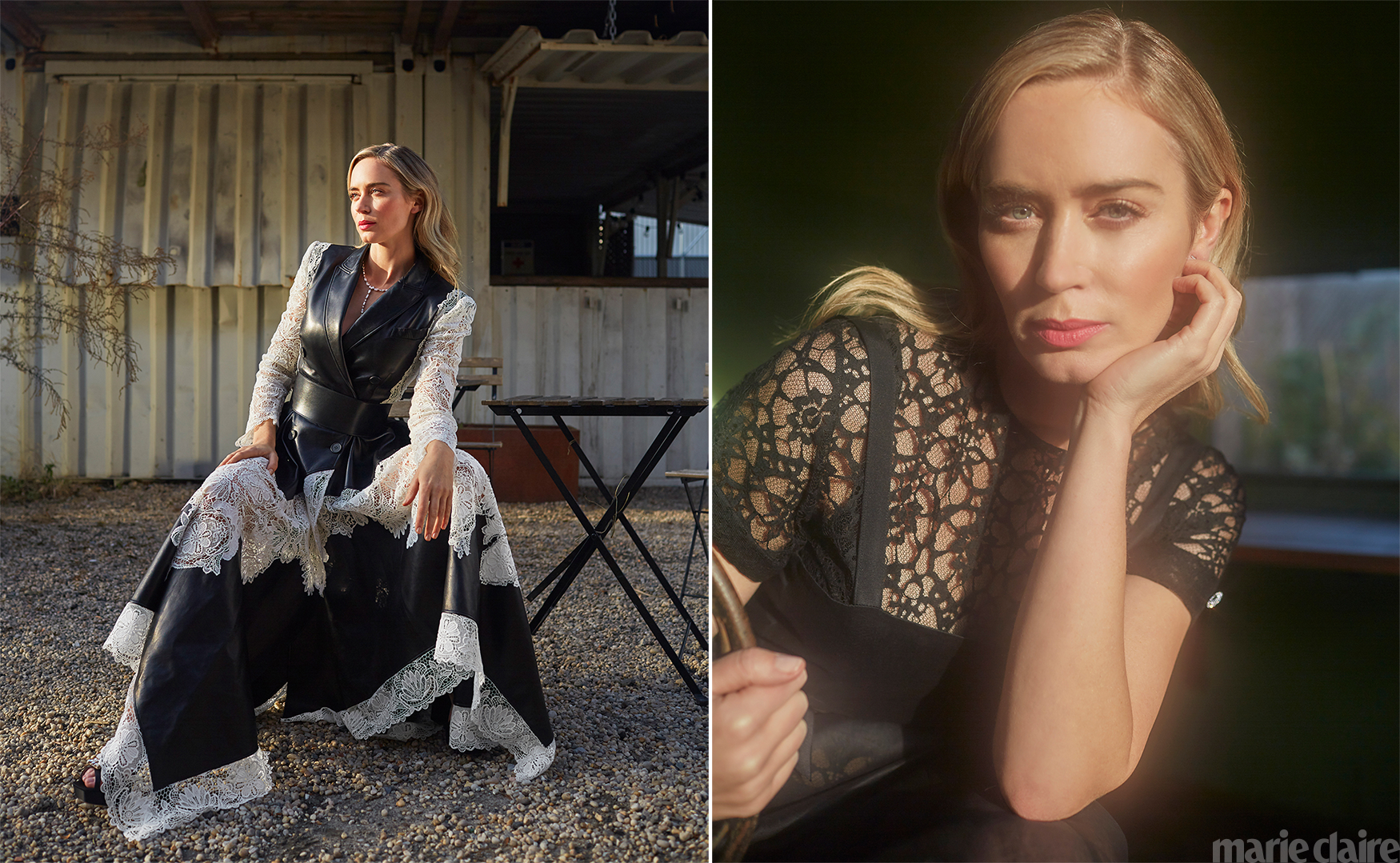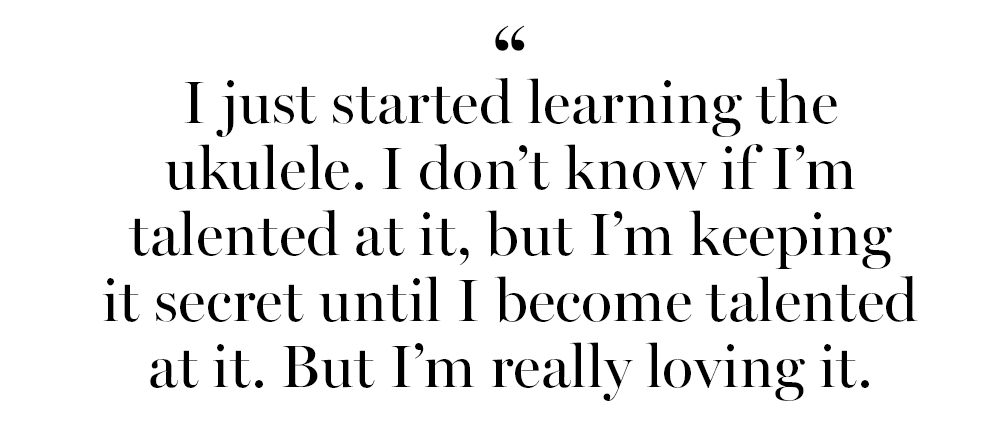How Emily Blunt's Stutter Led Her to a Successful Acting Career
In a candid conversation with the son of former Marie Claire Editor-in-Chief Anne Fulenwider, Blunt opens up about the profound effect her speech impediment has had on her life.

On a rainy afternoon last November, Emily Blunt came to our house in Brooklyn to talk to my 11-year-old son, Sammy, about something they have in common: stuttering. I’ve been a fan of hers since 2006’s The Devil Wears Prada (not to mention Edge of Tomorrow, Sicario, A Quiet Place, and Mary Poppins Returns), but I became an even bigger fan once I found out she was deeply involved in the American Institute for Stuttering (AIS), an organization that has played a large role in our family’s life. Sammy has attended the institute on and off since he was seven, and in 2016 he was asked to speak at its annual benefit in New York. The two other speakers that evening were then–vice president Joe Biden and Bruce Willis, and the whole night kicked off with a video from a very pregnant Emily, who has hosted the event since 2010. The evening changed all of our lives, especially Sammy’s, and I’ve been stalking Emily ever since to thank her for the work she has done for stutterers everywhere. This is how it came to pass that, three years later, she showed up at our door, took off her shoes in the foyer, ate our homemade banana bread, petted our dog, and sat down with Sammy. It turns out that in addition to stuttering, they share a love of pranks and a talent for mimicry. Once the digital recorder was shut off, they performed their current favorite imitations of people in their lives, leaving us all doubled over in laughter. I didn’t think I could be a bigger fan, but she proved me wrong. What follows is a shortened account of their afternoon, edited in a few parts only for clarity. —Anne Fulenwider

Dior dress.
Sammy Blatstein: So, you’re from England. How do you like living in Brooklyn?
Emily Blunt: When I first met my husband, John [Krasinski], I was living in Los Angeles, and that was hard because it felt like the antithesis of what I had grown up in, a place with a sense of community and culture and real spontaneity and vibrancy. And I love walking cities. So moving to Brooklyn really felt like home to me. I think my soul was better suited to Brooklyn. I really love it.
Sammy: I know you had a stutter when you were growing up, or maybe you still do?
Emily: Once a stutterer, I feel, always a stutterer.
First outfit: Alexander McQueen dress, De Beers necklace, Roger Vivier shoes. Second outfit: Dior dress.
Sammy: What was school like with your stutter?
Get exclusive access to fashion and beauty trends, hot-off-the-press celebrity news, and more.
Emily: My stutter really started to take hold around six or seven and then kind of got progressively more challenging for me, and as I reached about 11 or 12, it was pretty ingrained. It wasn’t the whole part of me; it was just a part of who I was. There were certain people who liked to define me by that. That was tough. I decided not to really spend time with those people. I’ve probably only now come to realize that everybody has something growing up. That just happened to be my thing.
School was interesting because there were certain things I couldn’t do and wanted to, like read out my poem in class. I would never want to do that. I would hate it if the teacher called on me to answer something. I don't know what it's like for you, but I think when stutterers are put on the spot, that's hard. I didn't love calling my friends. I could never say my own name if someone said, “What’s your name?” Because you can’t substitute a word out, which is what we tend to do to find a better flow. You substitute another word that’s easier, and you can’t substitute your name. So I realized quickly as a kid, any pressurized situations were quite hard for me.
Sammy: You went to boarding school, right? What was that like? Did you miss your parents?
Emily: I went when I was 16, so I think I was probably ready to not miss my parents. And it was a cool boarding school because it was weekly boarding. I could come home every weekend. There was no pressure. We called all the teachers by their first name. So it suddenly felt like a bit of a university experience, and I dug it, and it was very artistic and very cool. It felt like a bit of a reinvention. Sometimes we all maybe feel we need to rediscover and reinvent ourselves. And so, when you’re at the same school for a longtime, which I was, you’re kind of defined by being a certain person in a certain way, and to get that fresh start at 16 was really big for me. That must be what it felt like to [be at your new school last year], right?

Sammy: Yeah. It was cool. I feel like half my friends don’t even know that I stutter. They just think that maybe he can’t get his words out as fast or something.
Emily: What do you think people think about stuttering?
Sammy: In my school, we have this thing called the Daily News. And they pull people out of this bin that has all of our names. And when my name comes up, I have to read the news about what’s going on in school. I feel like sometimes when I stutter, people think, He’s a bad reader.
Emily: Right? There’s a lot of misidentification. I love the American Institute of Stuttering and what they teach kids, because actually it’s really not about “Oh, I stutter really badly.” It’s more “I stutter really well. I’m a brilliant stutterer.” It’s sort of the reverse psychology. That’s really helpful. The [lack of] information out there, or the way people misconstrue what it is, is the main issue. Because stutterers don’t feel understood. It’s not psychological. It’s not that you’re nervous, it’s not that you’re insecure, it’s not that you can’t read, it’s not that you don’t know what you want to say. It’s neurological, it’s genetic, it’s biological. It’s not your fault. There’s nothing you can do about it. Those are the messages I’m trying to get out there so that you’re not in a situation where you’re reading something and people think, Oh, he might not be a good reader. I’m sure you’re a brilliant reader. A huge percentage of people around the world, millions and millions of people, stutter. I guess through AIS, you’ve met other stutterers?

Kate Spade dress, Simon G. Jewelry earrings.
Sammy: Yes. Through AIS I’ve actually met Joe Biden and Bruce Willis.
Emily: Come on now, how cool is that? You were [at the AIS benefit] the year Bruce spoke, and you spoke too, didn’t you? I didn’t get to see you because I was just about to have my second baby. Bruce was really nervous to speak. He didn’t want to when I first approached him about it. Then he realized that it was such a cool cause. And how amazing is that? Bruce Willis is so cool that everyone else’s cool factor hits the floor when he walks in the room—and he’s a stutterer.
In 2009, the AIS gave me that same Freeing Voices, Changing Lives award that Bruce got. And from that moment on, I’ve been very much apart of it all. I just love what they do. I didn’t have the knowledge of what it was and why I stuttered. They just really cemented a lot of information for me. Like, it’s genetic. It runs very prominently in my family, and my uncle, my cousin, and my grandfather all stuttered.

Sammy: How has stuttering affected your life?
Emily: I think in some ways, when you go through something like having a stutter, you become a really good listener. You absorb the world in a different way. Because you’re maybe less inclined to talk when you’re going through it. You become really conscious of a lot of stuff going around you, so I think I was a really observant kid. I was a really empathetic kid and still feel that’s something I try and lead with. And I encourage empathy in my kids and embracing differences and not being scared of them, or teasing people for them, you know? Making mistakes, or feeling like you have something that causes you to make mistakes, is a good thing. It’s how you learn, and it’s how you grow. When you go through something like that, you establish a real sense of kindness. And you’ve got to be kind to yourself and you’re going to be kind to other people.
Sammy: How did you go from a stuttering kid to a Hollywood actor?
Emily: It goes back to the stuttering, strangely. When I was 12, my class teacher was this really cool guy called Mr. McHale. He was this enormous man with a massive mustache. He asked me if I wanted to do the class play, and I said no. And he said, “But I think you can do it. I’ve heard you doing silly voices and mimicking people. So if you did it in a silly voice, would you consider doing it? Why don’t you do it in an accent?” And that was a very liberating thing for me as a kid. Suddenly, I had a fluency. The removal of yourself from yourself, in some ways, was freeing. I agreed to it, and I did speak completely fluently. I did a really bad northern English accent, which I won’t even try and do for you now. That was the beginning of realizing that I had a handle on it, and maybe it could be temporary, and maybe I could grow past this. That was kind of a big deal. It’s not the reason I went into acting, even though that makes for a good story. Because still, after that experience, I wasn’t planning on being an actress. I really enjoyed acting, and I liked doing the class plays, but I didn’t have that burning ambition for it. I was going to go to university, I wanted to do Spanish, I wanted to work in the U.N.; I had all these plans. I always loved languages. I didn’t stutter when I spoke other languages. But then I did a play at boarding school that went to the Edinburgh Festival Fringe.

Left: Alexander McQueen dress, De Beers necklace, Roger Vivier shoes. Right: Chanel dress.
Sammy: That’s awesome.
Emily: There was a teacher who was in it with me. He called his agent and said, “You’ve got to come see this girl.” He came to see me and said, “I think you’re really good. Do you want to try this?” And I said OK. I had a really casual attitude toward it, and that maybe is no bad thing. It’s such a competitive sort of soul-devouring business. I enjoyed auditioning because I didn’t have any pressure; I didn’t need to win. If it didn’t work, it was OK. It was just something I thought I’d try, and then I’ve fallen madly in love with it. I can’t imagine doing anything else now. I don’t know what I would do, nor would I be qualified for anything.
First outfit: Marc Jacobs top, Vera Wang pants, Harry Winston earrings, and Giuseppe Zanotti shoes. Second outfit:Dolce & Gabbana bra and top, Vera Wang pants.
Anne: We’ve learned about so many actors who stutter. Is there some kind of a connection?
Emily: I talked to a holistic doctor about this. He says stuttering, a lot of the time, is an imbalance in the left and right sides of the brain. And in your everyday life, when you’re talking to somebody, let’s say you access A, B, C, D of your brain. But when you act, when you have to go somewhere emotional and go somewhere that is not you, you access this whole other side of your brain that activates, and it frees you up. And that’s why you’ve got Bruce Willis, Samuel L. Jackson, Harvey Keitel, Ed Sheeran, James Earl Jones—I mean, it goes on and on and on. Kendrick Lamar, who is like the best rapper around, is a stutterer, and when he speaks verse he doesn’t stutter. So you’re accessing a completely different side of your brain with line memory, with a real removal of yourself from the situation, and acting is sort of the ultimate form of empathy. You’re empathizing with someone else’s dilemma, with someone else’s life, and so I think it frees you up. I just don’t think anyone stutters when they’re acting. So I think you should try.
Sammy: OK. But when you’re acting in movies, have you ever had to cut in the middle of a scene because you got tripped up by a word?
Emily: The only time I feel I sometimes stutter when acting is in these high-octane scenes where there’s an emergency happening, where I have to say, like, “Get in the car!” or “Where’s your bag?” or something like that. I was speaking to Samuel L. Jackson when he got the award one year. He said he was shooting one of the Marvel movies and had a scene where he had to say, “Let’s get out of here!” and he couldn’t say it. It was a scene with one of those crazy explosions going off. Instead, he said, “We got to go!” And they said, “Cut. Sam, the line’s ‘Let’s get out of here.’” And he said,“Yeah, got it.” He had to fake that he’d forgotten it. He went to say it again and said, “We got to go!” And he said, “You know what, I’m just going to change the line.”
Those high-octane emotional scenes, where I’m having to demand information out of somebody, are the only times where I feel I trip up.

Balenciaga dress, Messika Paris necklace.
Sammy: Me and my mom were talking about A Quiet Place and Mary Poppins. In Mary Poppins, all your talking was really fast. And in A Quiet Place, you barely talk at all.
Emily: Which is much nicer. Yeah, really convenient actually. It’s a perfect role for a stutterer, being quiet. That’s why we’re doing another one. I was like, “John, this is a good zone for me.” If I could just do Quiet Place movies for the rest of my life.
Anne: But in Mary Poppins, you speak really fast.
Emily: Yes. And that’s my own fault. That’s a choice that I made. It really was a character choice. It’s a really specific, very posh British accent of the 1930s era. I also felt, here she is, this woman who’s coming into people’s lives who are living with pain or loss and a sense of heaviness and weight, and she should just be lighter than air. Just come in like a tornado and sweep it all up and make everything right again.
I don’t ever consider my stutter now when it comes to what roles I choose or why I want to do it. It is not something that I even think about. And any sort of stutter steps I might have, or things that I’ll get tripped up on, or lines that could be tricky, I’ll sort of just find a way around them. I think with experience, you discover the confidence in knowing you’ll just find a way around it.

Sammy: Do you like scary movies?
Emily: Not at all.
Sammy: Yeah, same.
Emily: So, see? Stuttering trait. I feel that once those images are emblazoned on my mind, they’re there forever. I don’t think I can get rid of them, and I scare easily. I don’t want to watch scary films, and actually John had never watched scary films before he did Quiet Place. It’s sort of funny that he’s become this horror director and writer because those were not the films that we would ever watch. In research for shooting the film—I mean, his Apple TV is really disturbing right now, the films that he has purchased. Everything from The Babadook to The Witch. He watched all of them for research. But neither of us are big horror fans necessarily.
What I love about Quiet Place, and I think what people have gravitated toward—it’s not gory and horrifying, it’s tense, and it’s an intense experience watching it, but it has deeper themes of how far you’d go to protect your family, and it’s a big metaphor for parenthood, the first one. That idea of releasing your children out into the big bad world and not being able to protect them and what all parents feel. It’s on a magnified level in Quiet Place that there’s aliens who have come to destroy you if you make a sound.
Anne: I’m curious. I notice something when Sammy watches Joe Biden speak in the debates. Sammy will say, “See, he was going to stutter there, and he switched words.” He notices, and he reads him in a completely different way. Do you have that almost Spidey sense of picking up on others’ stuttering?
Emily: I think you do have a Spidey sense if you’re a stutterer, and I can spot one a mile off. And I’m sure you can too, Sammy. Because I spot all the tics and all the little idiosyncrasies that people do when they’re about to stutter, or they’re hiding it, or they’re masking it. You spot all the tricks because you do them yourself. That’s really interesting that you’ve been watching Joe and seeing those little trips. Because I think we all still have them, and it’s not necessarily that there’s a fumbling for the word. The word is tripping you.
Anne: But you and Joe Biden and Bruce Willis, you all seem to have figured out a way to manage in the world with a stutter.
Emily: You do. You figure it out.
For our March issue, Marie Claire partnered with Red Hook Labs—a studio, gallery space, and school in Brooklyn, New York that teaches and supports young photographers. In their first magazine assignment, Denise Hewitt (age 17), Lucci Mia (age 19), and Genesis Gil (age 21) shot three covers for us all through their unique lenses. See all of the covers on Instagram and make sure to grab a copy (or three!) on newsstands.

This article originally appears in the March 2020 issue of Marie Claire.
Lead photo: Dolce & Gabbana bra and top.
Photographer: Lucci Mia, Denise Hewitt, and Genesis Gil for Red Hook Labs
Fashion Editor: J. Errico
Hair: Laini Reeves at A. Spiegelman Management
Makeup: Jenn Streicher at Forward Artists for Chanel
Manicure: Kayo Higuchi at Bryan Bantry Agency for Chanel Vernis
Production: Red Hook Labs